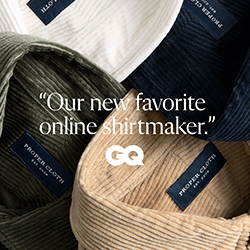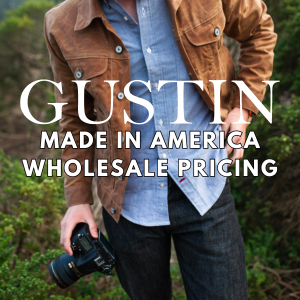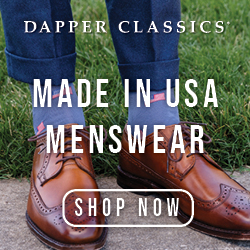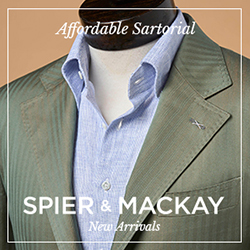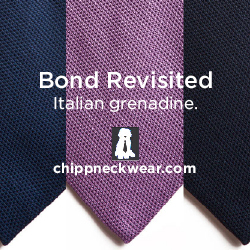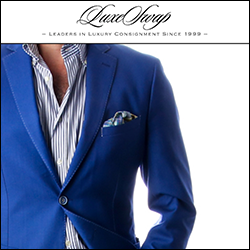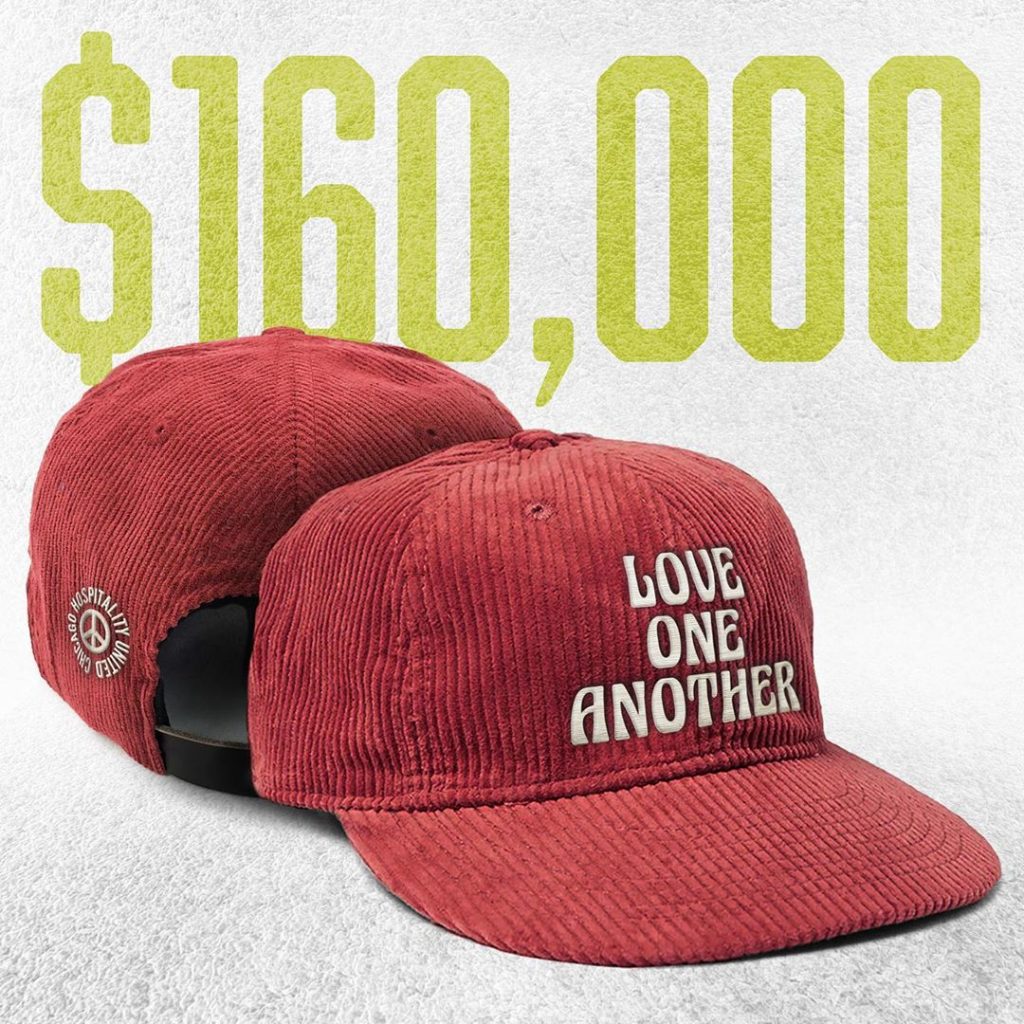
Chicago-based restauranteur Wade McElroy started to see the writing on the wall a few weeks ago. As fears of the coronavirus loomed larger for Americans, he knew a stay-at-home order would snuff out any of the remaining business he saw in his community. So McElroy text-messaged his friend Tim Tierney, co-founder of the menswear brand and clothing factory Stock Mfg Co. “I want to produce a t-shirt to raise money for hospitality workers,” he wrote. “A ‘Support Hospitality Workers’ design with all the proceeds going to a fund managed by a collective of bars and restaurants.” Tierney immediately texted back to say he loved the idea.
Over the next ten days, other Chicago-based businesses jumped in on the project. Jenna Liberman, a hospitality PR guru and the owner of Slow Down, helped with the messaging. The people at Luckyprints offered to make merchandise at a discount. Cody Hudson of Struggle Inc. came up with a design for more products. There was also a raffle. Chef Sam Goldbroch contributed a handmade chef’s knife; Danielle Chutinthranond of Monsoon Pottery put in a set of four brushstroke plates; menswear shop Notre chipped in a pair of handmade Air Max-inspired rugs by local artisan Moira Quinn. All of this was to help Chicago’s hospitality workers — the people who wait on tables, deliver food, and serve drinks — who were among the first to be laid off or furloughed due to the coronavirus pandemic. Dorri McWhorter, CEO of the YWCA, helped with the accounting to ensure these funds would get to the right people, while also eliminating tax liability and providing a strong paper trail.
Two weeks later, this loosely organized Chicago collective raised over $183,000 in net sales (the image above was made for their Instagram when they hit $160k). At the moment, the profits are being distributed to workers at a hundred Chicago-based bars and restaurants. $100,000 was wired on March 26th, while the rest will be sent after the team finalizes their cost of goods sold and fulfillment charges. And the demand for these items continues to run high. As of yesterday, people are still posting new messages on Stock Mfg’s Instagram, asking if the company will be re-running their dusty red baseball cap, cut and sewn from a wide-waled corduroy, that says “Love One Another.”
This project is just one of many stories about how small businesses around the world are banding together to help others. In the last few weeks, there have been articles on how big companies have risen to the challenge, often filling in where the government has lagged. In the United States, Hickey Freeman, Brooks Brothers, and Allen Edmonds have converted their factories to manufacture protective masks and gowns. LVMH has donated more than 65 metric tons of hand-sanitizer to French hospitals. Prada donated six new intensive care units to hospitals in Milan. Nike, Ralph Lauren, Hermes, Zegna, and Gucci have given money, some as much as $20 million. But there hasn’t been much attention paid to how small businesses are doing their part. While these companies are tiny when compared to international conglomerates, their efforts are adding up. And they tell a story of how many small businesses are driven by values, even when faced with immense economic pressure.
Shortly after the Bay Area imposed its quarantine in March, Greg Lellouche of No Man Walks Alone announced that his store will be offering a 20% discount on all orders with the checkout code STAYSAFE (the promotion is still running). Additionally, he’s committing 20% of his store’s gross profits to Meals on Wheels, a program that delivers meals to people at home if they’re unable to prepare their own food. No Man Walks Alone was among the first menswear companies to fundraise for a non-profit in this crisis. “When a crisis like this hits, there’s a tendency to run for the hills, close up, and focus on your own survival, but that’s denying the power of community, which can be an agent of good,” says Lellouche. “I wanted to focus on seniors who are having the hardest time in this crisis, both materially with access to supplies and food, and psychologically with fear and isolation. I read about Meals on Wheels’ efforts to bring meals to seniors across America during this pandemic. They care for and feed that segment of our population that’s most at risk right now, and I want to help support and acknowledge those efforts.”
In the last couple of weeks, hundreds of fundraising efforts have popped up like this. Corridor is giving 10% of their sales this month to New York’s City Harvest, an organization that helps feed the hungry. The Anthology, a classic menswear label based in Hong Kong and Taipei, is coming out with a t-shirt next week to raise money for various international health organizations. Standard & Strange is committing 2% of all their revenue this year to Alameda County Community Food Bank; Aime Leon Dore is donating 10% of their SS20 proceeds to Mount Sinai’s COVID-19 Response Fund. Additionally, Robert Geller and Knickerbocker are coming out with special edition t-shirts. Proceeds from their sales will go to COVID-19 relief efforts.
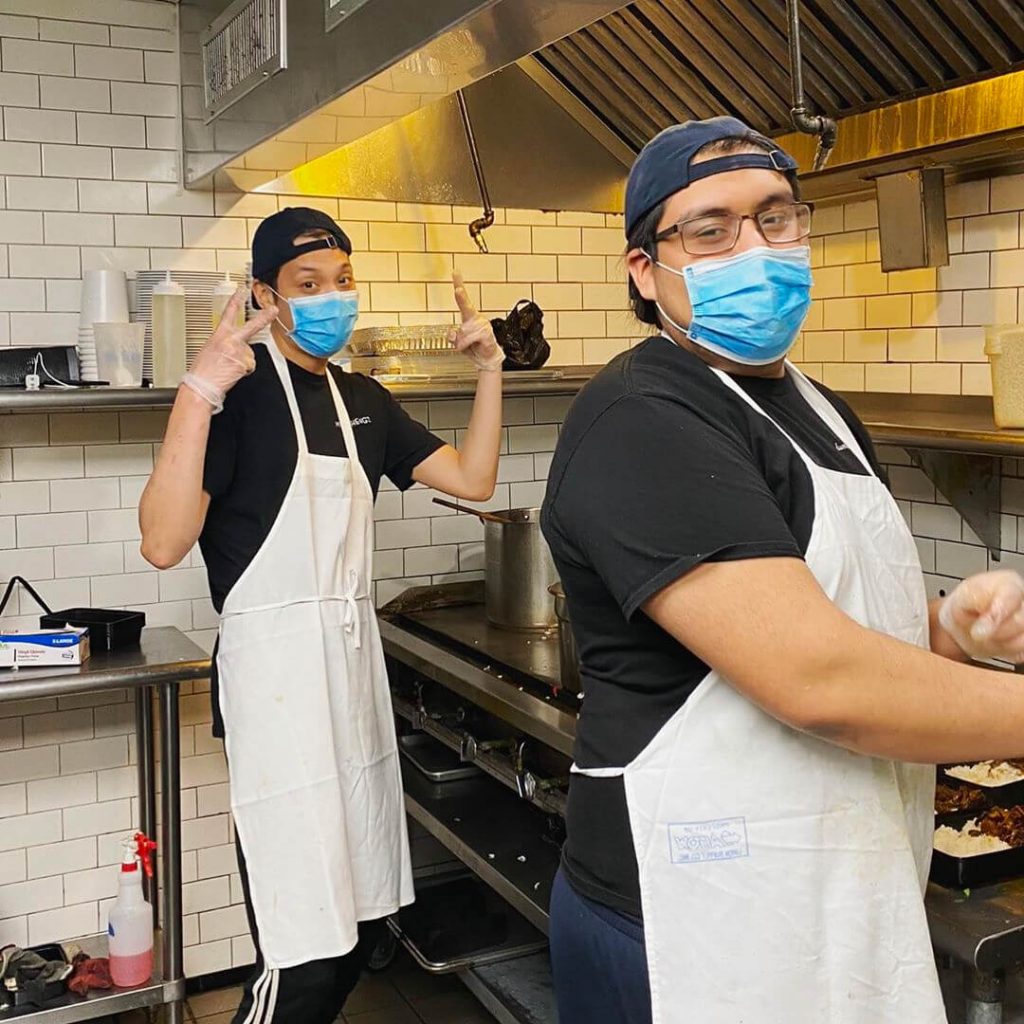
Proper Cloth is teaming with Mimi Cheng to feed medical workers
Two weeks ago, one of our sponsors, Proper Cloth, also donated $20 for every shirt they sold online. The money went directly to the Food Bank For New York City to help those who lack food security. “We regularly donate to about ten charities,” says the company’s public relations manager, Daniel Zisman. “These range from the Center of Employment Opportunities to the Fortune Society to Careers Made Possible. When this COVID-19 crisis hit, we felt the Food Bank for New York was a great place for us to start because they’re transparent about how many meals each dollar contributes.” Over the course of a single day’s promotion, Proper Cloth was able to raise $9,600, which went to buying 96,000 meals. This week, they’re continuing that effort. For every shirt sold today, they’re contributing $20 to Mimi Cheng’s “Dumplings for Doctors” initiative, which is providing hot meals to overworked doctors and nurses in New York City. On Thursday, they’re running a similar promotion for Meals on Wheels.
Andrew Chen, the co-founder of the workwear brand 3sixteen, says it’s been a challenge trying to manage concerns about others while also keeping an eye on his company’s bottom line. The downturn is hitting small menswear brands hard, and every dollar that goes to a charity is a dollar that can’t be used for payroll. But ultimately, he and his team feel it’s important to support those who are suffering the most, so they’ve donated a portion of their sales to No Kid Hungry. “One of the biggest drawbacks to closing the schools is that many kids get their most nutritious and sizable meals of the day at school,” Chen explains. “By supporting No Kid Hungry, we can help them provide meals to kids in low-income neighborhoods, as well as fund food banks and soup kitchens in neighborhoods where residents desperately need them.”
The company’s name, 3sixteen, is a reference to the Biblical verse John 3:16, which some have dubbed the “Gospel in a nutshell” for how it sums up the central theme of Christianity. When asked if his Christian faith drives his company’s philanthropy, Chen says it’s part of his broader set of values. “Our values are very important to us,” he says. “Not to say that people who don’t share our faith — or any faith — can’t do good things, but for us, this is our reason. We don’t exist to maximize profits. We sell a luxury good that we try to execute to the best of our ability. But we also recognize that we’re part of a larger society, and if we’re blessed enough to be able to make a good living off of what we do, we should share that success with those who are less fortunate. I think some of this is tied to my personal journey in learning about injustice — how it has manifested throughout our history and continues to systemically oppress certain groups in so many ways. Giving has always been in our brand’s DNA. In our first year of business, we gave a portion of our profits to charities. Back then, it was only like a thousand or two. It’s not a ton of money now, but it’s more.”
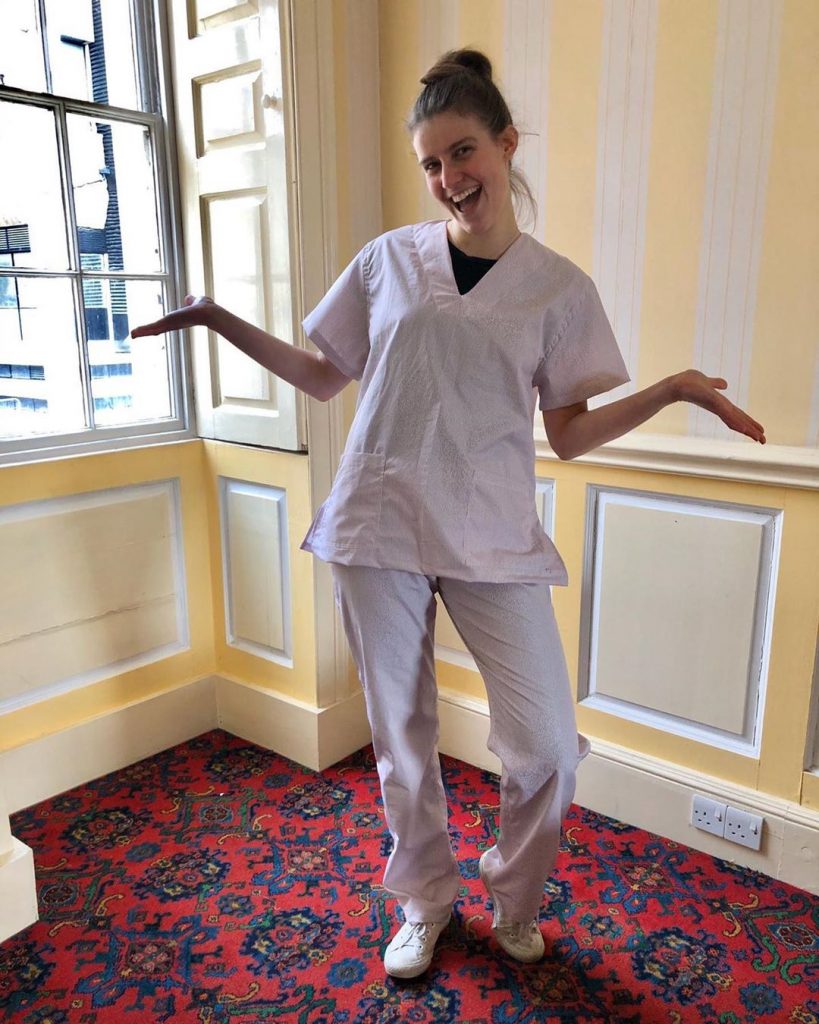
A worker at Emma Willis modeling the new scrubs
In interviewing people for this post, I was surprised to find how many people in the menswear industry are working longer and harder shifts, even with the economic downturn. One industry veteran I spoke to was pulling 14 hour days, as he’s working to supply front-line medical workers with the personal protective equipment (PPE) they need to stay safe. Greg Shugar, CEO and Creative Director of the Beau Ties, is also using his manufacturing experience to try to secure PPE. “After learning that silk and cotton are not the best materials for masks, and that our tie-making factory can only make a few dozen masks a day, I started reaching out to hospitals and medical centers to understand their needs better,” he tells me. “I spoke with purchasing departments and learned that they needed 10,000, 50,000, 100,000, 500,000 masks now. Now! I knew we couldn’t do it ourselves.”
So Shugar reached out to his contacts in China, which he made back when he imported ties for The Tie Bar. He stayed up all night to teleconference with Chinese factory owners until he found a few that make masks. He’s now working on importing KN95 masks, which are similar to the N95, and hoping to get them certified, approved, and in the hands of healthcare professionals. Meanwhile, seamstresses at his Vermont tie-manufacturing plant are volunteering their time to produce masks for in-home health workers. Those are made from silk and cotton fabrics Sugar has on hand. While they’re not up to snuff for hospital workers, he hopes they can help those living and working in assisted care facilities, where older people are at high risk. “We are donating all of them,” he says.
Similar efforts are happening around the world as small-scale clothing factories are pivoting. Over in London, Jermyn Street shirtmaker Emma Willis has repurposed their cutting tables and sewing machines to produce hospital scrubs for NHS workers. Their stock of Riviera Swiss cotton fabric, which is normally reserved for bespoke clients, is now being used to clothe nurses at Gloucester Royal Hospital. “The home team includes Syrian refugee Ibrahim Khalil, who is particularly happy to support the NHS,” the company wrote on their Instagram, “He says Britain gave him back his daughter, who was very ill when they arrived from Syria two years ago.”
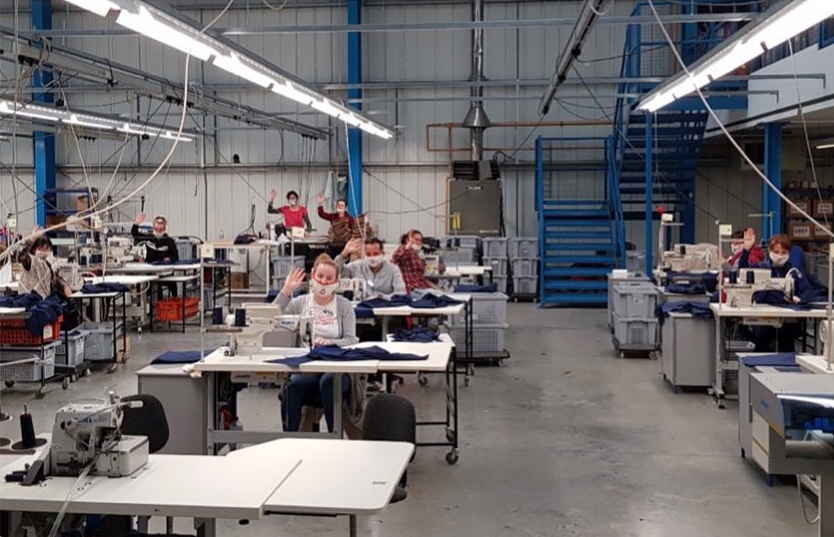
Workers at Cookson & Clegg
Earlier this week, the first NHS scrubs came off the line at Cookson & Clegg’s factory in Blackburn, using a specialty fabric from Pincroft in Chorley, another partner factory. The speed at which these items are being produced is tremendous. “Technical specifications arrived at 10 am Tuesday, patterns were cut out, and samples were made by Tuesday night, and samples were inspected and approved by NHS supplier Alsico in Preston at 10 am on Wednesday,” they wrote. “Bulk fabric was forklifted off the lorry at 3 pm Wednesday and went straight into the cutting room. The first 700 pairs went onto the sewing line at 2 pm on Thursday afternoon, and the first pieces reached the end of the line by 4 pm Friday. Three days for a process that would normally take about three months and all achieved under incredibly strict new working practices, at a time of great anxiety for many.”
Here in the United States, Raleigh Denim is making masks out of Burlington’s Barrier Maxima, a medical-grade, breathable material used in protective medical uniforms. They sold the first hundred of each size to cover the costs of making them, while the rest were donated for free to people at hospitals and grocery stores. The company is also making “Courage Together” t-shirts to raise money for the NC Restaurant Relief Fund.
Meanwhile, over in Italy, which has been hard hit by this virus, I Sarti Italiani has put their bespoke tailoring workshop towards the sole task of making medical masks. Sartoria Carrara, another Italian workshop, has done the same. “We first started to feel the crisis quite early when our Chinese workshop made us aware of it,” says Patrick Johnson, founder of P. Johnson Tailors and co-owner of Sartoria Carrara. “The Chinese factory kicked into action very fast. They had one line making protective clothing and one making masks. They shared all of this information and know-how with us. So when Italy started seeing coronavirus cases, we were ready. We are mainly focused on masks at our Italian workshop, Sartoria Carrara, and most of those masks went to the local hospital. Then my friend and client Mario Carbone in New York reached out to see if we could help supply masks to some New York hospitals. We couldn’t spare any from Italy, as they are still in the thick of it, so we pulled all of our resources and got an initial shipment of masks together for NYC. Now it’s getting harder. Sending masks from Australia is now punishable by five years of jail time, so we have to find some from elsewhere. We have managed to get another shipment ready, but I am hoping we can get more.”
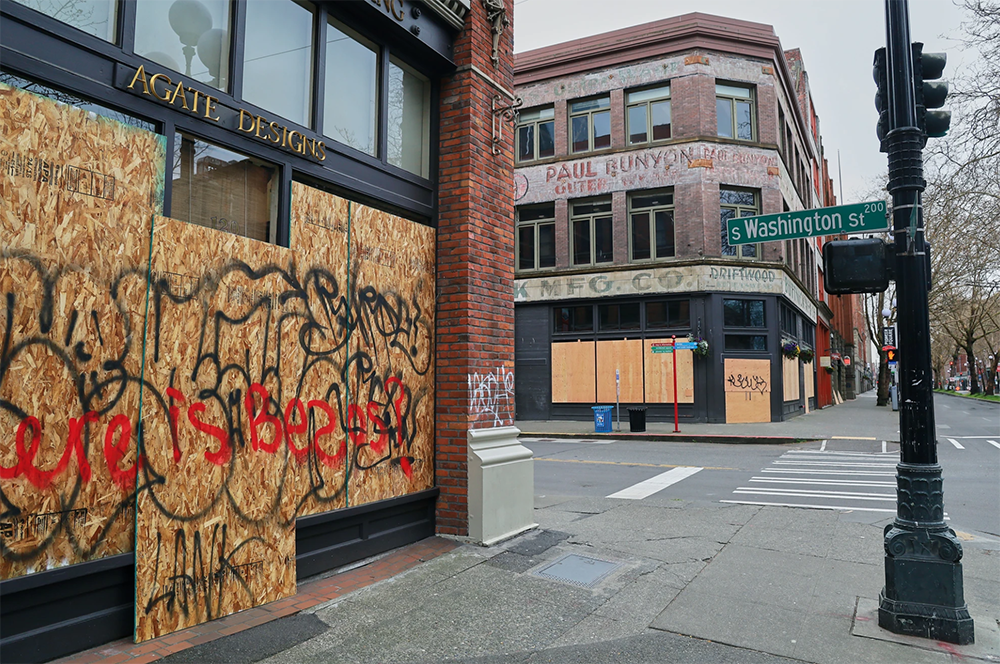
The Pioneer Square neighborhood in Seattle, Washington
Division Road, a heritage menswear boutique based in Seattle, Washington, also headed the call last month when they saw small businesses in their neighborhood being adversely impacted. As workers in their community were being laid off, they knew that federal and state funds wouldn’t get into people’s hands quickly enough to help them pay for food and rent. So they took 10% of their gross profits and put them directly in other workers’ hands. This month, they’re having one of the restaurants still left in their neighborhood do catering for one or two of the local homeless shelters. And they’re setting up something they call their “Contribute Through Craft” program, where they’ll continue to contribute 10% of their gross profits to needs they see directly happening in their Pioneer Square neighborhood.
Jason Pecarich, the shop’s proprietor, says this is part of his shop’s ethos —focus on things you know are real and tangible, things you can see. By focusing on his neighborhood at the street level, he can directly assess what needs to be done and how he can help. “We would have preferred to do something in a bigger way, but frankly, if everyone focuses on their own concentric circles and what they can do to support others, we’ll all get through this better off,” he says. “As you see the government and companies rolling out big plans, and the system fails at the first stage of action, it proves our point. Those who are really in need are getting left behind, so our aim to pay our employees, vendors, partners, and then create an avenue where our clients can see money from their purchases going directly into the hands of those having a hard time. Whether we like it or not, we’re in a community, whether it be Pioneer Square, the city of Seattle, the Northwest, the United States, or earth — we’re all in it together. Our business has been successful by keeping things to scale, rather than just expanding for expanding sake. Our whole position towards goods and our presentation is that bigger is not always better, and sometimes there is even more virtue in the small, quality acts.”
A few weeks ago, Everlane caught some political heat when their workers accused them of union-busting. Bernie Sanders (or more likely, someone running Bernie Sanders’ Twitter account) tweeted something about it, which drew them more negative attention. Everlane’s founder Michael Preysman responded by saying the recent round of layoffs has nothing to do with the union, but rather the negative cash balance and forced shutdown. Dozens of articles have been since written on the issue, but Vogue’s might be the fairest. “Make no mistake, that rationale applies to every brand, at least the ones that are profitable,” Emily Farra wrote. “Fashion is a business. But for the wave of 2010s-era labels that have traded on their ethical values—fair wages, sustainable sourcing, gender equality, ‘people first’—we tend to expect a bit more. That partly explains why Everlane, a company that prides itself on ‘radical transparency’ and makes T-shirts printed with ‘100% human,’ has found itself in the center of a Twitter storm.”
There are many small businesses, however, who are living up to their values. After nearly fifteen years of heritage and Americana companies, as well as top-tier luxury brands, telling us that they’re doing right by their workers and community, some of them are actually keeping that promise, even when faced with immense economic pressure.
Note, this post is part of our ongoing series on small businesses. You can keep up with it by following our Support Small Businesses hashtag.
